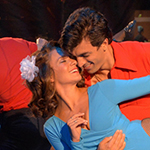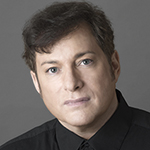Jean Brassard
I Have Lived: Jean Brassard Salutes Aznavour
Pangea, NYC, September 23, 2019
Reviewed by Alix Cohen for Cabaret Scenes
jpg” alt=”” width=”212″ height=”212″ /> Jean Brassard
Photo: Alex Palombo
“Before Aznavour, despair was unpopular.” — Jean Cocteau
Singing “Yesterday, when I was young,” Jean Brassard begins weaving through the packed club on his way to its stage. “There is the crux of Aznavour’s world, but perhaps it’s not irretrievable, let’s go back.”
“At eighteen I grew restless for the city/I’d see its lights that beckoned from afar.” “J’ai veçu” (“It Will Be My Day”; English: Bob Morrison). Brassard sings first in English and then in French, embodying youthful aspiration. The artist is at first animated, bouncing. “I’ve struggled and strived, but never arrived, and I’m still unknown” it ends lyrically exhaling. Apparently Aznavour was 36 when he wrote the evocative song.
Management was skeptical of “negativity,” but it was hugely popular.
Between signature numbers, Brassard sketches Aznavour’s life: early recognition; time with Edith Piaf (who believed in him as a songwriter, not as a performer and often disparaged the young man); the nature and possible reason of his often angry and/or melancholy oeuvre; his later prosperity.
A wonderful version of “Emmenez-moi” (“Take Me Along”; English: Dee Shipman) catches us up in a boy’s yearning for the sea and faraway places. These might’ve been the thoughts of Fanny’s love, Marius (The Fanny Trilogy by Marcel Pagnol). When Brassard addresses invisible sailors, we practically see them.
Lyrics arrive in English and French. The artist is an actor. He invests in the material, gesturing to illustrate, putting himself “there.” Combining speaking, parlando, and singing works well.
Sweep and drama are best, however, when not broken into by invented dialogue or spoken lyrics from the performer’s talented MD/pianist, Kathleen Landis. She’s so committed to this collaboration she at one point awkwardly sits silently in a spotlight ostensibly reflecting the emotion of a character about whom Brassard sings.
The familiar “J’aime Paris au mois de Mai” (with Pierre Roche) is jaunty. Were the stage larger, Brassard might capably give us a bit of soft shoe. “Who?” (“Qui?”; English: Jean
Brassard) arrives accusatory. Shoulders rise with octave change with Brassard gradually turning his back to the betrayer. “There Is a Time” (“Le Temps”; English: Gene Lees/Jeff Davis) finds the audience swaying. “For me Formidable” (with Jacques Plante) is adorable.
This excellent performer might present a better show with the participation of outside eyes. His Yves Montand salute was reined in and beautifully directed.




